- Home
- Parents & Carers
- Social, Emotional and Mental Health (SEMH)
Social, Emotional and Mental Health (SEMH)
What is Social, Emotional and Mental Health (SEMH) and what can we support your child with?
Our emotions lead us to act and behave in certain ways. We know that being able to manage our emotions and share our feelings is essential for children to be able to thrive and make the most out of school. Therefore, at The Langley Academy Primary, we are committed to supporting the emotional health and wellbeing of our pupils and staff. We know that everyone experiences life challenges that can make us vulnerable at times, anyone may need additional emotional support. We take the view that positive mental health is everybody’s business and that we all have a role to play.
Social, Emotional and Mental Health (SEMH) is the area of health that includes the ability to express needs, wants and emotions in a positive way, manage anger, conflict, and deal appropriately with frustrations. It involves practising life skills, making responsible decisions, developing good character, following a plan to manage stress and being resilient during challenging times.
At The Langley Academy Primary, we can:
- help our children to understand their emotions and feel better
- help our children to feel comfortable when sharing any concerns or worries
- help our children socially, so that they can form and maintain friendships
- promote core values that our children can use throughout your lives
How can we support our children?
Children’s mental health and wellbeing is the responsibility of all staff at The Langley Academy Primary. We can help children with:
- Playground conflicts
- Friendship issues
- Emotional support.
Sometimes this is done through informal talks at other times, we use set meetings.
What are ELSAs?
Sometimes staff can help children on a one-one basis or sometimes in a small social group, this is called targeted support: It is led by our team of ELSAs (Emotional Literacy Support Assistants). ELSAs are trained by Educational Psychologists to be able to provide personalised interventions to support a child’s emotional wellbeing. We are a very happy, friendly team who are always available to listen to you or your child. If you have any worries or concerns, so come and have a chat.
Who's Who - Mental Health Team
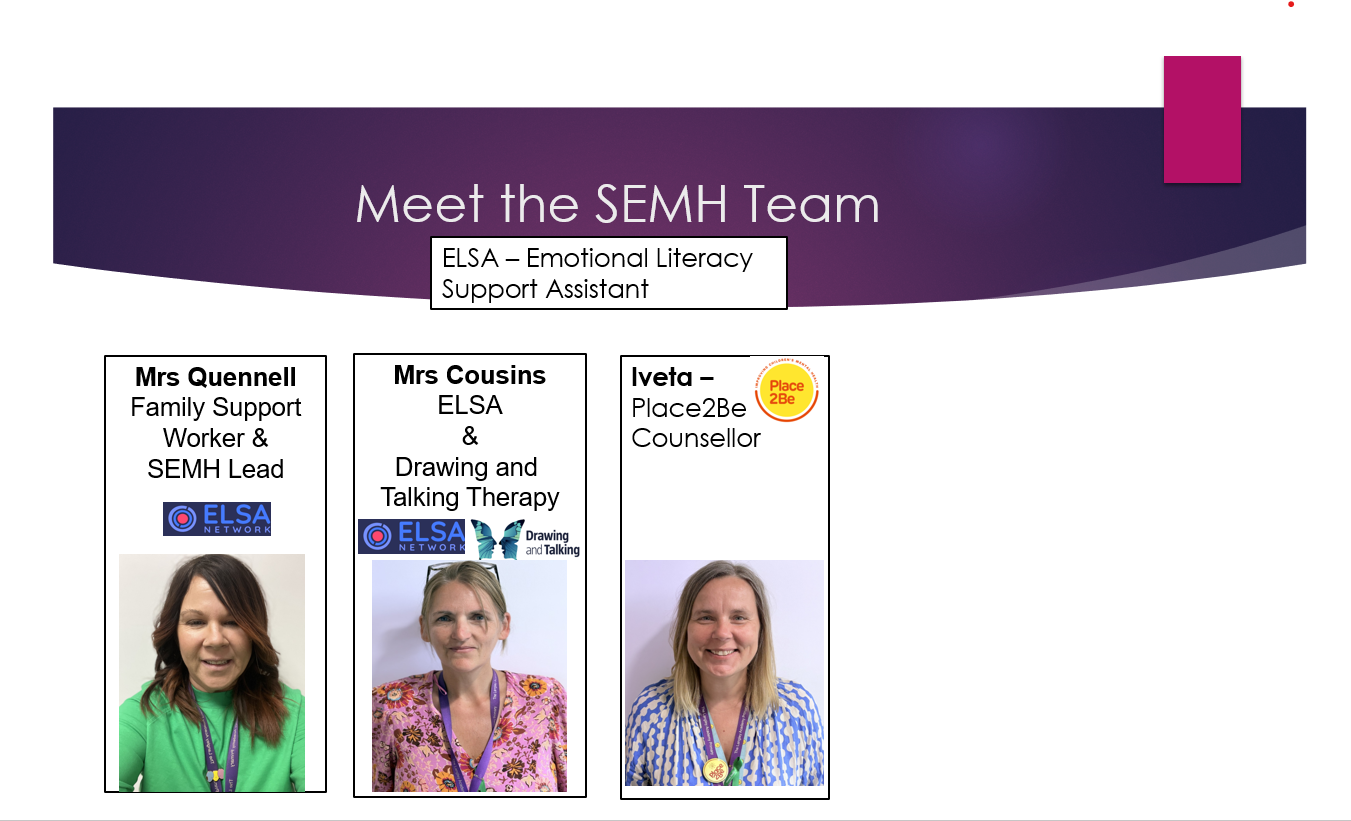
Our ELSA team are very well trained. They can help your child with developing strategies to:
- Reduce anxiety
- Boost self-esteem
- Improve relationships and friendships
- Develop problem solving and thinking skills
- Cope with loss and bereavement
- Improve their social skills
- Recognise and cope with different emotions
- Overcome attachment issues to find the start of the day easier
Improving Childrens Mental Health

As well as having a team of ELSAs, we are also able to offer Place2Be support. Place2Be provides child counselling and mental health support at The Langley Academy Primary. Children can go to the Place2Be room in school. Here, under support of the counsellor, the children can express themselves through art, playing, or talking.
Place 2 Be counsellors work closely with pupils, families, and staff to improve the emotional wellbeing and provide mental health support to the whole school. Place2Be also runs Place2talk session where a child can self-refer to talk about any worries or concerns. There is further information about Place 2 Be on our website.
Zones of Regulation
Our staff are trained to recognise behaviour as a form of communication. Our behaviour is usually a sign of a child’s feelings. To help children understand this, we use The Zones of Regulation. Each zone links to different emotions and this helps children to develop ‘self-regulation.’ Self-regulation has many other names such as ‘self-control,’ ‘impulse management’ and ‘self-management.’
Self-regulation is the ability for children to understand and manage their own behaviour and reactions. Self-regulation helps children to learn, behave well, get along with others and become independent. We know that children begin to learn how to self-regulate from their early years and this develops through childhood.
From time to time, everyone (including adults) find it hard to manage strong feelings such as worry, anger, restlessness, fear, or tiredness, and this stops us from getting on with our day effectively. Children who feel these emotions often find it hard to learn and concentrate in school. The Zones of Regulation aims to teach children strategies to help them cope with these feelings so they can get back to feeling calm and ready to learn (we call this the green zone).
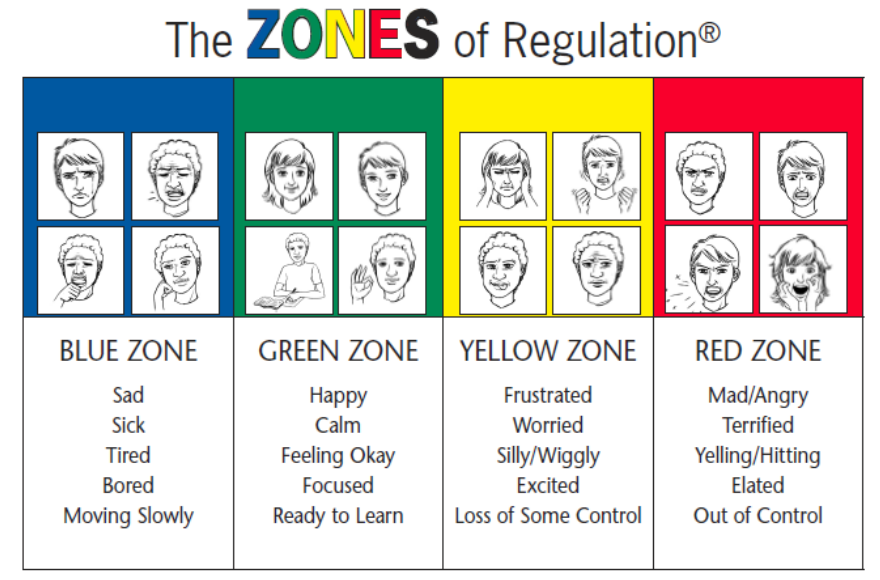
Additionally, you can consider the Zones in this manner:
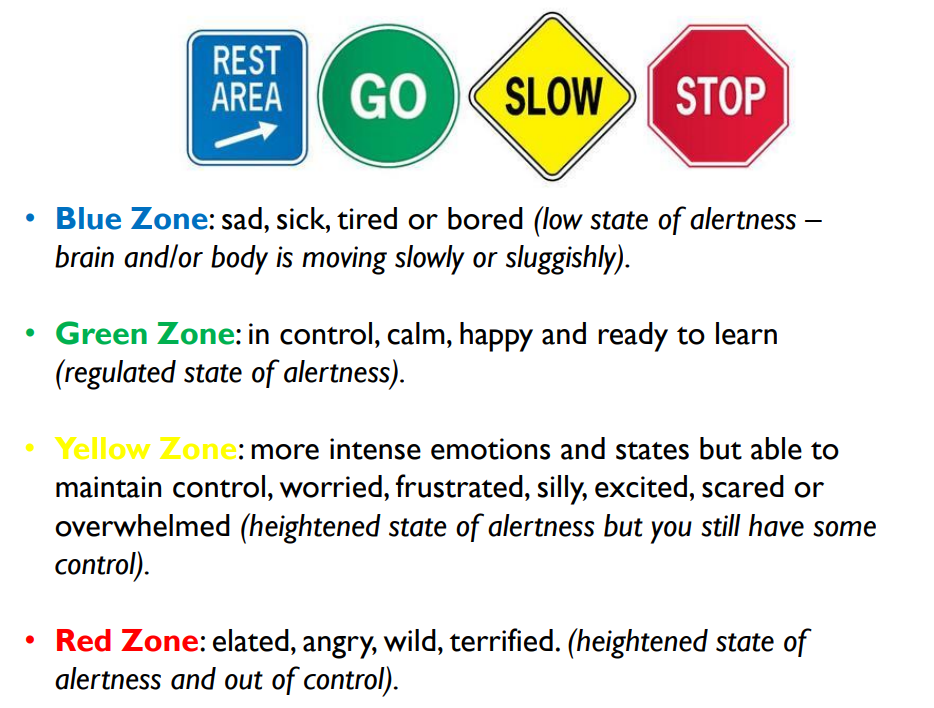
Further information can be found at The Zones of Regulation | A Curriculum For Emotional Regulation
How can I support my child at home?
If you think your child might need help with their social, emotional, and mental health needs at home you can support them in the following ways:
- Recognise when your child may be anxious, worried stressed or experiencing other difficulties to see what triggers this behaviour (please see image on how to spot anxiety)
- You can model on yourself about how you feel and how to address it “I am feeling stressed because… I think what would help me is…”
- Anxiety is contagious so try to be calm, consistent and highlight positives
- Providing warmth makes others feel secure and it is important to be understanding and reassuring
- Try to challenge anxious or negative thinking that the child may be having in a supportive coaching way. For instance, by asking “What is your evidence for that?” “Will it always be like that?” “Are there any other explanations?” and “What is the worst that could happen?”
- Using worry diaries at home consistently and at a set time
- Listening to relaxing music or meditations, such as that from mindfulness
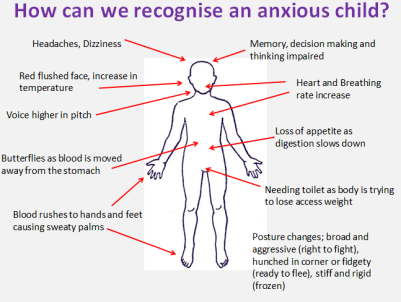
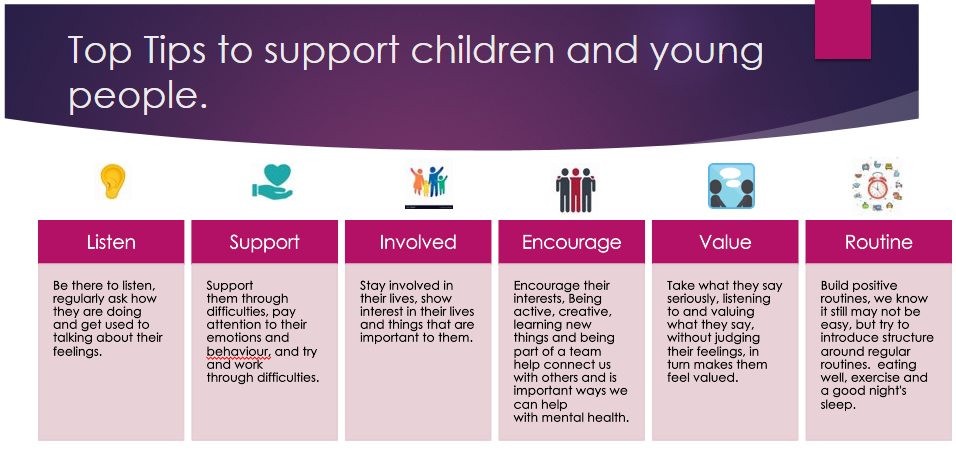
Useful Mental Health websites
Mental Health and Emotional Wellbeing Policy
The Mental Health and Wellbeing Policy can be found on the Arbib Education Trust using the link below.


